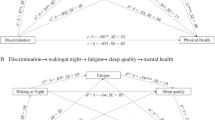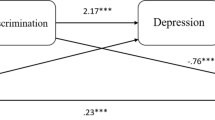Abstract
Little research investigates whether sleep mediates the adverse effect of perceived discrimination on health and even less is known about whether sleep quality and sleep duration mediate the relationships in the same fashion. We applied a recently developed mediation analysis approach to a survey administered in 2008 in Philadelphia, PA, that includes 9042 adults. Health was measured with self-rated health, stress, and mental illness. Perceived discrimination was operationalized with self-reported discriminatory experience in two social contexts, namely health care system and housing market. Sleep quality and duration were measured with a five-point Likert scale and the self-reported sleep time at night, respectively. After controlling for one’s demographic, socioeconomic, and health-related characteristics, the mediation analysis quantified how much sleep quality and duration can account for the effect of perceived discrimination on these health outcomes. The key findings are: (a) sleep quality and duration accounted for approximately 15 to 25 % of the adverse effect of perceived discrimination. (b) Sleep quality is more important than sleep duration in mediating the relationship between perceived discrimination and health. (c) The proportion of the effect mediated by sleep differs by the social context where perceived discrimination occurred. It was confirmed that sleep mediates the relationship between perceived discrimination and health and the interventions to improve sleep, particularly sleep quality, should help to attenuate the effect of perceived discrimination on health.


Similar content being viewed by others
References
Pascoe EA, Smart RL. Perceived discrimination and health: a meta-analytic review. Psychol Bull. 2009; 135(4): 531.
Larson LK. Employee Health--AIDS Discrimination. Employment Discrimination. Vol 10. Matthew Bender; 2014.
Pager D, Shepherd H. The sociology of discrimination: racial discrimination in employment, housing, credit, and consumer markets. Annu Rev Sociol. 2008; 34: 181.
Gee GC. A multilevel analysis of the relationship between institutional and individual racial discrimination and health status. Am J Public Health. 2002; 92(4): 615–623.
Finch BK, Kolody B, Vega WA. Perceived discrimination and depression among Mexican-origin adults in California. J Health Soc Behav. 2000; 41(3): 295–313.
Williams DR, Mohammed SA. Discrimination and racial disparities in health: evidence and needed research. J Behav Med. 2009; 32(1): 20–47.
Aneshensel CS. Social stress: theory and research. Annu Rev Sociol. 1992; 18: 15–38.
Selye H. Stress in Health and Diseases. Boston, MA: Butterworth; 1976.
Chen D, Yang T-C. The pathways from perceived discrimination to self-rated health: an investigation of the roles of distrust, social capital, and health behaviors. Soc Sci Med. 2014; 104: 64–73.
Steffen PR, Bowden M. Sleep disturbance mediates the relationship between perceived racism and depressive symptoms. Ethn Dis. 2006; 5(6): 8–11.
Williams DR, Neighbors HW, Jackson JS. Racial/ethnic discrimination and health: findings from community studies. Am J Public Health. 2003; 93(2): 200–208.
Borrell LN, Kiefe CI, Williams DR, Diez-Roux AV, Gordon-Larsen P. Self-reported health, perceived racial discrimination, and skin color in African Americans in the CARDIA study. Soc Sci Med. 2006; 63(6): 1415–1427.
Slopen N, Lewis TT, Williams DR. Discrimination and sleep: a systematic review. Sleep Medicine. 2015. doi:10.1016/j.sleep.2015.01.012.
Brondolo E, Gallo LC, Myers HF. Race, racism and health: disparities, mechanisms, and interventions. J Behav Med. 2009; 32(1): 1–8.
Brondolo E, Hausmann LR, Jhalani J, et al. Dimensions of perceived racism and self-reported health: examination of racial/ethnic differences and potential mediators. Ann Behav Med. 2011; 42(1): 14–28.
Noh S, Kaspar V. Perceived discrimination and depression: moderating effects of coping, acculturation, and ethnic support. Am J Public Health. 2003; 93(2): 232–238.
Buckley TM, Schatzberg AF. On the interactions of the hypothalamic-pituitary-adrenal (HPA) axis and sleep: normal HPA axis activity and circadian rhythm, exemplary sleep disorders. J Clin Endocrinol Metabol. 2005; 90(5): 3106–3114.
Magee CA, Caputi P, Iverson DC. Relationships between self-rated health, quality of life and sleep duration in middle aged and elderly Australians. Sleep Med. 2011; 12(4): 346–350.
Moore PJ, Adler NE, Williams DR, Jackson JS. Socioeconomic status and health: the role of sleep. Psychosom Med. 2002; 64(2): 337–344.
Tsuno N, Besset A, Ritchie K. Sleep and depression. J Clin Psychiatry. 2005; 66(10): 1254–1269.
Buxton OM, Marcelli E. Short and long sleep are positively associated with obesity, diabetes, hypertension, and cardiovascular disease among adults in the United States. Soc Sci Med. 2010; 71(5): 1027–1036.
Cappuccio FP, Taggart FM, Kandala N-B, Currie A. Meta-analysis of short sleep duration and obesity in children and adults. Sleep. 2008; 31(5): 619.
Gangwisch JE, Heymsfield SB, Boden-Albala B, et al. Short sleep duration as a risk factor for hypertension analyses of the first national health and nutrition examination survey. Hypertension. 2006; 47(5): 833–839.
Ayas NT, White DP, Manson JE, et al. A prospective study of sleep duration and coronary heart disease in women. Arch Intern Med. 2003; 163(2): 205–209.
Cappuccio FP, D'Elia L, Strazzullo P, Miller MA. Quantity and quality of sleep and incidence of type 2 diabetes: a systematic review and meta-analysis. Diabetes Care. 2010; 33(2): 414–420.
Yang T-C, Matthews SA, Chen VY-J. Stochastic variability in stress, sleep duration, and sleep quality across the distribution of body mass index: insights from quantile regression. Int J Behav Med. 2014; 21(2): 282–291.
Public Health Management Corporation (PHMC). Household Health Survey Documentation. Philadelphia, PA; 2008.
Yang T-C, Matthews SA, Hillemeier MM. Effect of health care system distrust on breast and cervical cancer screening in Philadelphia, Pennsylvania. Am J Public Health. 2011; 101(7): 1297–1305.
Idler EL, Benyamini Y. Self-rated health and mortality: a review of twenty-seven community studies. J Health Soc Behav. 1997; 38(1): 21–37.
Lazarus RS. Theory-based stress measurement. Psychol Inq. 1990; 1(1): 3–13.
Krueger PM, Friedman EM. Sleep duration in the United States: a cross-sectional population-based study. Am J Epidemiol. 2009; 169(9): 1052–1063.
Breen R, Karlson KB, Holm A. Total, direct, and indirect effects in logit and probit models. Sociol Methods Res. 2013; 42(2): 164–191.
Karlson KB, Holm A. Decomposing primary and secondary effects: a new decomposition method. Res Soc Stratification Mobil. 2011; 29(2): 221–237.
MacKinnon DP, Dwyer JH. Estimating mediated effects in prevention studies. Eval Rev. 1993; 17(2): 144–158.
Karlson KB, Holm A, Breen R. Comparing regression coefficients between same-sample nested models using logit and probit a new method. Sociol Methodol. 2012; 42(1): 286–313.
Brondolo E, Rieppi R, Kelly KP, Gerin W. Perceived racism and blood pressure: a review of the literature and conceptual and methodological critique. Ann Behav Med. 2003; 25(1): 55–65.
Broudy R, Brondolo E, Coakley V, et al. Perceived ethnic discrimination in relation to daily moods and negative social interactions. J Behav Med. 2007; 30(1): 31–43.
Krieger N, Sidney S. Racial discrimination and blood pressure: the CARDIA study of young black and white adults. Am J Public Health. 1996; 86(10): 1370–1378.
De Niet G, Tiemens B, Lendemeijer B, Hutschemaekers G. Music‐assisted relaxation to improve sleep quality: meta‐analysis. J Adv Nurs. 2009; 65(7): 1356–1364.
King AC, Oman RF, Brassington GS, Bliwise DL, Haskell WL. Moderate-intensity exercise and self-rated quality of sleep in older adults: a randomized controlled trial. J Am Med Assoc (JAMA). 1997; 277(1): 32–37.
Peuhkuri K, Sihvola N, Korpela R. Diet promotes sleep duration and quality. Nutr Res. 2012; 32(5): 309–319.
Ferrie JE, Shipley MJ, Cappuccio FP, et al. A prospective study of change in sleep duration: associations with mortality in the Whitehall II cohort. Sleep. 2007; 30(12): 1659.
Hayes AF. Introduction to mediation, moderation, and conditional process analysis: a regression-based approach. New York, NY: Guilford Press; 2013.
Acknowledgments
We acknowledge the assistance from the Center for Social and Demographic Analysis at the University at Albany, State University of New York, which receives core funding from NICHD [R24-HD044943].
Author information
Authors and Affiliations
Corresponding author
Rights and permissions
About this article
Cite this article
Yang, TC., Park, K. To What Extent do Sleep Quality and Duration Mediate the Effect of Perceived Discrimination on Health? Evidence from Philadelphia. J Urban Health 92, 1024–1037 (2015). https://doi.org/10.1007/s11524-015-9986-8
Published:
Issue Date:
DOI: https://doi.org/10.1007/s11524-015-9986-8




